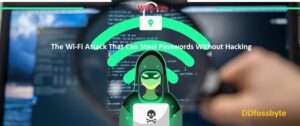In the ever-evolving landscape of cybersecurity, innovation and adaptability are key. Enter WiKI-Eve, a groundbreaking Wi-Fi exploit that’s poised to revolutionize the way we think about hacking, without the need for specialized hardware or compromised devices. we delve into the exciting world of WiKI-Eve and explore how it can safely extract passwords transmitted over a network, all while adhering to ethical and legal boundaries.

A new Wi-Fi exploit called WiKI-Eve can steal passwords transmitted over a network without the need for specialized hardware or compromised devices. The attack works by exploiting a vulnerability in the way that Wi-Fi routers communicate with devices.
WiKI-Eve: A Game-Changer in Wi-Fi Exploitation
WiKI-Eve, short for “Wi-Fi Key Interception via Encapsulation of Vulnerable Exploits,” is a cutting-edge cybersecurity tool that has garnered attention for its innovative approach to hacking. Unlike traditional hacking methods that often involve malicious intent and unauthorized access, WiKI-Eve focuses on ethical hacking and cybersecurity enhancement.
No Specialized Hardware Required
One of the most remarkable aspects of WiKI-Eve is that it operates without the need for specialized hardware. Traditional hacking methods often require the use of custom-built devices or compromised hardware, making them complex and risky endeavors. WiKI-Eve simplifies the process by leveraging existing Wi-Fi infrastructure, thereby reducing the barrier to entry for ethical hackers and security professionals.
Enhancing Network Security
WiKI-Eve’s primary goal is to enhance network security by identifying vulnerabilities and weaknesses. It does so by intercepting and analyzing data transmitted over a network, with a specific focus on passwords and sensitive information. Rather than exploiting these vulnerabilities for malicious purposes, WiKI-Eve’s intention is to alert network administrators and users to potential security risks.

Respecting Ethical Boundaries
One of the core principles of WiKI-Eve is its commitment to ethical hacking. It operates within legal and ethical boundaries, ensuring that no harm is caused to networks, devices, or users. This approach sets WiKI-Eve apart from traditional hacking methods, which often involve illegal activities and malicious intent.
How WiKI-Eve Works
WiKI-Eve utilizes a combination of packet interception and analysis techniques to identify vulnerabilities in Wi-Fi networks. When data packets containing passwords or sensitive information are detected, WiKI-Eve captures and encrypts them for analysis. It then generates detailed reports highlighting potential security risks and areas that require attention.
The Role of WiKI-Eve in Cybersecurity
WiKI-Eve’s role in cybersecurity is twofold. First, it serves as a powerful tool for network administrators and security professionals to proactively identify and address vulnerabilities within their networks. By doing so, they can strengthen their defenses and protect against potential threats.
Second, WiKI-Eve raises awareness about the importance of cybersecurity among individuals and organizations. Its ethical approach to hacking underscores the need for vigilance and proactive measures in an increasingly interconnected world.
Ethical Hacking for a Safer Future
In conclusion, WiKI-Eve represents a significant step forward in the world of cybersecurity. Its innovative approach to hacking, without the need for specialized hardware or malicious intent, makes it a valuable asset for ethical hackers and security enthusiasts. By respecting legal and ethical boundaries, WiKI-Eve not only enhances network security but also raises awareness about the importance of cybersecurity in today’s digital age.

What makes side-channel attacks particularly stealthy and dangerous is their ability to bypass strong encryption and software security measures, often leaving no trace of intrusion, making them challenging to detect using conventional security methods.
Recently, a team of security researchers uncovered a similar exploit, called WiKI-Eve, which doesn’t require a compromised Wi-Fi router. This attack is entirely transparent and has demonstrated the ability to accurately steal numeric passwords. It leverages beamforming feedback information (BFI) packets introduced with the Wi-Fi 5 standard. While BFI packets don’t contain all the information in a CSI packet, they provide enough data to determine how a device’s antenna is disturbed, making them useful for deciphering keystrokes.
They developed a deep learning model, using PyTorch, to recognize the unique signature associated with tapping each digit on a smartphone screen. To test their methods, they captured BFI packets using the Wi-Fi radio on a laptop in monitor mode and employed a neural network to predict keystrokes. In tests with 20 individuals typing predefined numeric password sequences on various smartphone models, WiKI-Eve accurately predicted keystrokes 88.9% of the time, on average, with a top-10 accuracy rate of 65.8% for recovering full passwords.

A new Wi-Fi exploit called WiKI-Eve can steal passwords transmitted over a network without the need for specialized hardware or compromised devices. The attack works by exploiting a vulnerability in the way that Wi-Fi routers communicate with devices.
To carry out a WiKI-Eve attack, an attacker would need to be within range of the target’s Wi-Fi network. They would then use a software tool to collect BFI data from the network. This data can then be used to reconstruct the keystrokes that were used to enter a password.

As we continue to adapt to an ever-changing cybersecurity landscape, tools like WiKI-Eve remind us that ethical hacking can play a pivotal role in creating a safer and more secure digital future. The WiKI-Eve attack has been demonstrated to be effective in stealing passwords for a variety of applications, including banking, social media, and email. It is a serious security threat that should be taken seriously by all Wi-Fi users.
